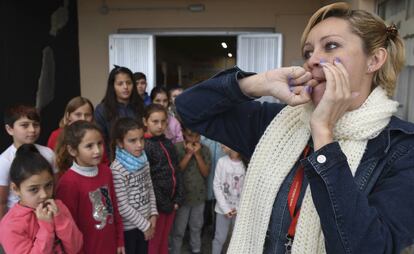New generations learn Spain’s ancient whistled language of La Gomera
Authorities propose teaching the Unesco-recognized mode of communication at all schools on the Canary Islands

For centuries, whistling was used by shepherds and farmers to communicate over the large ravines that separated them in La Gomera, the second-smallest of the main Canary Islands, in Spain.
With four consonants and two vowels, the whistler is capable of articulating phrases and words in Spanish or any other language
The silbo gomero was in danger of disappearing until 1999, when it began to be officially taught in the island’s schools in an effort to revitalize the tradition. Today, the regional government, led by the Canaries Coalition, has proposed offering courses taught by certified teachers at other centers across the archipelago.
The origins of the language, which was declared Intangible Cultural Heritage by Unesco in 2009, are hotly debated. Many believe that it was used before the Castilian conquest in the 15th century by the Guanche inhabitants of La Gomera, based on testimonies from French chronologists Pierre Boutier and Jean Le Vierre, who wrote of the island’s people who spoke “the strangest language of all the regions, speaking with their lips as if they lacked a tongue.”
The silbo gomero (the Gomera whistle) is a phonological system that substitutes spoken language. With four consonants and two vowels, the whistler is capable of articulating phrases and words in their spoken language, which in this case is Spanish. However, they can also whistle in any other language. “It’s a very interesting language,” says Marcial Morera, professor of Spanish Philology at La Laguna University. “It could be taught in any general linguistics course, because it demonstrates clearly how a natural language is organized.”
The 1978 publication of the book El Silbo Gomero by the linguist Ramón Trujillo helped remove some of the stigma attached to the language because it was analyzed in a scientific light. “When children went to school, the teacher told them not to whistle because they sounded like peasants,” says Morera.
Yet it was in the villages where the whistle was revitalized. “When I arrived here, the island was completely void of its values and culture because of the people who had left it between the 1940s and the 1960s,” says Isidro Ortiz, a silbo gomero teacher and winner of the 2009 Canaries Award of Popular Culture. In 1988, Ortiz began giving whistling lessons to the children in his town outside of school hours. News quickly traveled to other municipalities and parent associations began asking him to teach it in other centers. “I told Juan Manuel García Ramos, the regional education chief, that if the language was not taught in school, it would disappear.”
Since its introduction into the education system 20 years ago, the language’s situation has improved tremendously. “Who would have thought that I would live to see this,” says Ortiz. Until now, the silbo gomero was taught 30 minutes a week in elementary school and in the first two grades of middle school during a class on Spanish Literature and Language.
The new program has extended two courses. Casimiro Curbelo, the president of the La Gomera Island Council and a member of the Gomera Socialist Group, asks for a “push to expand it to all the Canarian centers” without their having to request it.
There are successful pioneering institutions such as the Acentejo school in La Matanza in Tenerife, which has taught a silbo course for the past 15 years under Rogelio Botanz, a Basque whistler, teacher and singer-songwriter. Some of his students have won La Gomera’s annual whistling contest. “We have to implement it slowly. The approach to a language should be with love, or it’ll create opposition,” says Botanz.
English version by Asia London Palomba.
Tu suscripción se está usando en otro dispositivo
¿Quieres añadir otro usuario a tu suscripción?
Si continúas leyendo en este dispositivo, no se podrá leer en el otro.
FlechaTu suscripción se está usando en otro dispositivo y solo puedes acceder a EL PAÍS desde un dispositivo a la vez.
Si quieres compartir tu cuenta, cambia tu suscripción a la modalidad Premium, así podrás añadir otro usuario. Cada uno accederá con su propia cuenta de email, lo que os permitirá personalizar vuestra experiencia en EL PAÍS.
¿Tienes una suscripción de empresa? Accede aquí para contratar más cuentas.
En el caso de no saber quién está usando tu cuenta, te recomendamos cambiar tu contraseña aquí.
Si decides continuar compartiendo tu cuenta, este mensaje se mostrará en tu dispositivo y en el de la otra persona que está usando tu cuenta de forma indefinida, afectando a tu experiencia de lectura. Puedes consultar aquí los términos y condiciones de la suscripción digital.








































